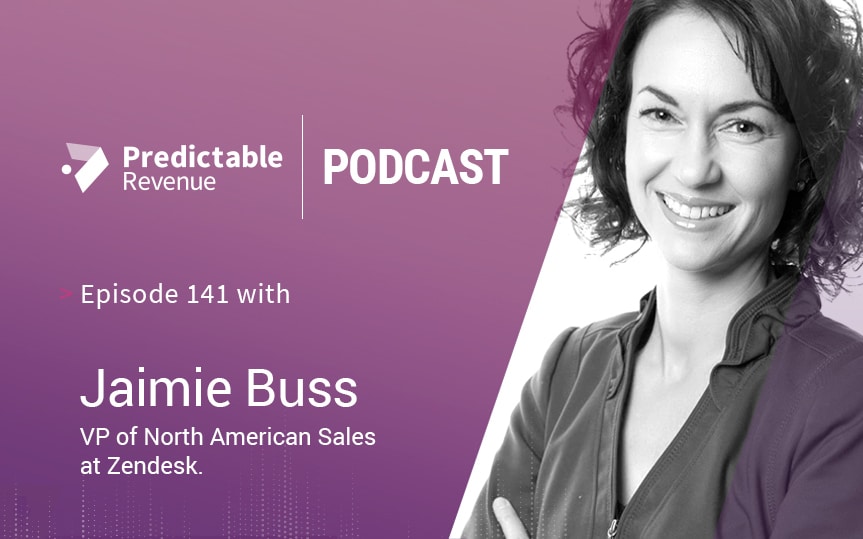How Zendesk’s Jaimie Buss Trains and Transforms Leaders

Leadership – a position, or level, many people want to ascend to, but few really have the personality for.
That’s what makes leadership such a tricky thing. Think, for a second, about how people transition into leadership: they are excellent sales reps, for instance, and crush their quota month after month. When that’s the case, transitioning into management is the next logical step.
Some sales reps – or individual contributors of many different stripes – don’t make great leaders. They can close with the best of them, but when it comes to leading and inspiring others, there remains a little to be desired.
That’s because leadership isn’t just an add-on to one’s job. It isn’t some reward for success. Effective leadership is actually an entirely different discipline that requires training, mentorship, focus, and dedication.
“For leadership and management – we have programs to have salespeople getting promoted. But, I found a gap a little while back. I didn’t actually know who was interested in being a leader. And we hadn’t invested in seeing whether anyone was interested,” says Jamie Buss, on a recent edition of The Predictable Revenue Podcast.
Being a leader is something you really have to like. It’s less money, you get a lot of crap from managers above you, and your reps. So, how do we get people to nominate themselves? And then build a program that would illustrate what being a leader entails? That became our project.
The Rising Stars program
That project, eventually, became Zendesk’s Rising Stars program – a six-month crash course into sales leadership, overseen by Buss and other members of Zendesk’s leadership team.
It’s a holistic program, open to those with at least one year of quota carrying experience, that teaches both new managers and senior managers topics such as: hiring, coaching, and managing (whether you’re a novice or experienced manager, these critical concepts can also be taught, re-taught, and refined).
Entrance into the program, adds Buss, is the result of a joint assessment by interested Zendesk employees, and their managers. Not everyone can simply decide to join Rising Stars – those who aren’t top performers will need to address gaps in their performance before joining a cohort.
To ensure that joint assessment program was consistent, the Zendesk team came up with a framework so managers and reps can gauge their Knowledge, Skills, and Qualities.
- In the “Knowledge” section, concepts such as product knowledge, industry knowledge, and competitive knowledge are considered.
- In the “Skills” section, concepts such as information gathering, presentation skills, listening skills, questioning skills, qualifying skills are considered.
- Finally, in the “Qualities” section, concepts such as problem solving, professionalism, motivation, attitude, integrity / trust, sense of urgency, team player, leadership, and overall intelligence are considered.
“Both sales reps and their managers score the reps, and review in a dedicated meeting. If there were strong gaps, they would put a development plan together and join the next class,” says Buss.
We have to make sure any gaps are filled.
(Editor’s note: we had Jamie Buss on the pod a while back to discuss her amazing forecasting process at Zendesk. You can read about our chat here, or listen to the entire in-depth interview here)
The six month journey
The Rising Stars program, as mentioned above, lasts for six month. In that time, a host of topics are covered – from how to effectively manage 1:1s, to more philosophical leadership concepts such as: ‘it’s not just about you,’ ‘being direct without being an asshole,’ and ‘teaching your people how to fish.’
“We are trying to effectively show the challenges you will face and what your responsibilities are as a manager,” says Buss.
So, we look at forecasting, giving feedback, communication or how to share best practices in a scalable way. I spend 1.5 hours with the cohorts to share my expectations of leadership and why it matters. I want them to know what they are signing up for.
The coaching circles
A fixture of the Rising Stars program are the leadership circles – think contained breakout sessions that deal with a particular leadership concept.
Coaching circles are usually rather busy (often up to 12 people attend), but once a particular topic is presented, attendees break into smaller groups of three for the discussion portion of the coaching circle.
At the end of the discussion portion, everyone comes back together and makes it actionable – they review what people had been saying, answer questions, and design some follow up with or action plans to help with whatever was being discussed.
Remote teams can participate in coaching circles. In those cases, groups of three break off into different Zoom rooms and, according to Buss, it has worked well.
It’s important to note, however, that the effectiveness of the coaching circles and the Rising Stars program as a whole, can convince participants that a career in management isn’t for them. In fact, two of the participants in Zendesk’s inaugural Rising Stars program decided against pursuing a career in leadership.
“The qualities you are learning in this program help you in a sales cycle as well. Good listening, asking good questions – all these things transfer into sales,” says Buss.
So, if you chose not to join management, your sales game is stronger as a result.
How do you become a great manager?
This, says Buss, is the question she’s been wrestling with for years. And, it’s the impetus for developing the Rising Stars program in the first place.
But the truth is, no matter how many books or classes you take, effective leadership remains a nuanced practice. For example, it requires a sense of understanding, and a desire to help and understand others.
“When I’m thinking of bringing someone into leadership, some of the questions you might ask are the dos and don’ts of 1:1s. Find out how they would handle 1:1s – this is a great topic,” says Buss.
For example, just passing down information or cancelling regularly is a red flag.
That interest in others, of course, will help keep an organization healthy and prevent team members from quitting.
“It costs 6 – 9 months to train a replacement. It is expensive to lose good people, especially for a flat role. If that is happening, that means we did something wrong,” explains Buss.
People leave their managers, not their jobs. We don’t want to be the managers that people leave – I want my team to be supported, and stay and grow.
But, she warns, effective managers know they can’t be everybody’s friend. That’s an easy trap to fall into, especially for young managers.
New managers are either way too nice, or not nice enough. When I started, I came in on the not nice end of the spectrum, and had to learn that balance. And that balance is what we’re, ultimately, trying to teach.
For more on Buss’ thoughts on leadership – including a detailed discussion on effective performance management – check out the rest of her interview on The Predictable Revenue Podcast.
NO TIME TO READ?
Listen On:


